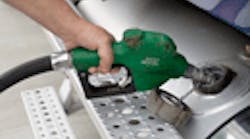Diesel fuel prices will remain volatile for the remainder of this year and likely well into next year. That trend will continue so long as the cost of crude oil remains tied to financial markets, which themselves are being roiled by continued bad economic news out of Europe - most damaging being the threat of a default by the government of Greece on that country’s monumental debt load.
According to the U.S. Energy Information Administration (EIA), the national average price for on-highway diesel fuel (see Weekly Retail On-Highway Diesel Prices Chart) climbed 8 cents from a week ago to $3.801 per gallon—and is now up almost 73 cents from a year ago.
Looking ahead, per its latest analysis, EIA projects that on-highway diesel fuel retail prices, which averaged $2.99 per gallon in 2010, will average $3.80 per gallon in 2011—but then drop a bit to $3.73 per gallon in 2012 (see U.S. Diesel Fuel and Crude Oil Prices Chart). Projected U.S. refinery diesel fuel margins will increase from an average of $0.39 per gallon in 2010 to $0.64 per gallon in 2011, than fall to an average of $0.56 per gallon in 2012.
EIA also forecasts that the annual average regular-grade gasoline retail price, which averaged $2.78 per gallon in 2010, will increase to an average of $3.52 per gallon in 2011, and to an average of $3.43 per gallon in 2012 (see U.S. Gasoline and Crude Oil Prices Chart).
The agency explained that the increase in gasoline retail prices in 2011 “reflects not only the higher cost of crude oil but also changes in the average U.S. refinery gasoline margin (the difference between refinery wholesale gasoline prices and the average cost of crude oil).” The average U.S. refinery gasoline margin increased from $0.34 per gallon in 2010 to $0.51 per gallon in 2011, but is expected to decline to $0.43 per gallon in 2012.
“Nationally, diesel prices are averaging about $3.84 per gallon or just a bit under that,” Denton Cinquegrana, editor-West Coast Spots for the Oil Price Information Service (OPIS), told Fleet Owner. “Supplies tightened this week. According to the Dept. of Energy (DOE), they dropped by 4.3 million barrels last week. Demand is steady for distillate, i.e. diesel fuel, but there is some question as to how much of that demand is being fueled by exports. Exports from the U.S. are growing, Just looking at the DOE’s numbers on gasoline imports vs. exports shows the U.S. is now, or at least was last week, a net exporter of gasoline. On a week-to week-basis, the DOE export data is not very reliable, but what is reliable is that the export trend is growing.”
Also affecting supply and thus prices, pointed out Cinquegrana, is that refineries are now in the middle of their autumn scheduled maintenance. “I would expect supplies to tighten before they start growing again,” he explained. “I do not see much price relief in the near term. If anything I see it being pretty steady through the remainder of the year.”
Trucking analyst Chris Brady, president of Commercial Motor Vehicle Consulting (CMVC), told Fleet Owner that as a commodity, oil has become so closely tied to the financial markets that the price for crude - and ultimately the price paid at the pump—will “go up and down” with those markets as well.
“Fuel prices are volatile now because the financial markets are volatile due to the fragile global economic conditions, especially in Europe.” According to Brady, this volatility may mean hedging on fuel may no longer work. “Oil prices are now as hard to predict as which way the stock market will go,” he explained. “If a fleet is hedging to limit their [diesel cost] increase, they will get burned if the price drops substantially,” which it may at any time. “Diesel was declining over the last week and a half, but they have shot back up now based simply on worries over what is happening in Europe.”




